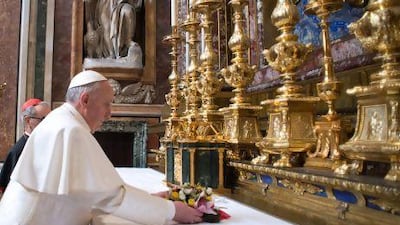CAIRO, JERUSALEM // Al Azhar, the 1,000-year-old seat of Sunni Islam learning, yesterday said it wanted "better relations" with the Vatican after years of acrimony.
On Wednesday an Argentine cardinal, Jorge Mario Bergogli, was elected to succeed Benedict XVI. He chose the name Francis.
Benedict's eight-year tenure was marked by scandals and controversies, including turbulent relations with the Muslim world.
"We are hoping for better relations with the Vatican after the election of the new pope," said Mahmud Azab, an adviser to Ahmed Al Tayyeb, grand imam of Al Azhar.
The departing pope angered Muslim leaders in 2006 when, in a lecture at a German university, he quoted a text written in the 14th century by one of the last Christian rulers of Constantinople.
"Show me just what [the Prophet] Mohammed brought that was new and there you will find things only evil and inhuman, such as his command to spread by the sword the faith he preached," the text said.
It drew rebukes from the Organisation of the Islamic Conference and Sheikh Yusuf Al Qaradawi, a well-known Egyptian imam and scholar who demanded an apology.
Al Azhar said it would cut ties with the Vatican when Benedict called for Christians in Egypt to be protected after a suicide bombing at an Alexandria church in January 2011.
But the new pope's charismatic reputation and relatively progressive political views have already stirred expectations of change.
Pope Francis yesterday received messages of goodwill from the President, Sheikh Khalifa, and other leaders of the nation.
And Palestinian Authority president Mahmoud Abbas has invited the pontiff to visit Bethlehem.
Bishop Camillo Ballin, the Kuwait-based apostolic vicar of Northern Arabia, described Benedict's leadership style as focusing "on teaching and principle".
But now, Bishop Ballin said, the "church [is] in need of a Pastor who puts those principles into practice".
William Shomali, the Vatican's auxiliary bishop in Jerusalem, said that "Benedict was seen in a critical light by Muslims", and that there was a yearning within the church for Pope Francis to engage Islam with offers of dialogue.
"We hope that he will give off a better impression," Bishop Shomali said. "Islam is a beautiful religion, a widespread religion, and it's important for peace among humanity to have good relations between Christianity and Islam."
He said he hoped the new leader would continue with the church's policy of addressing the difficulties facing Christians in the region, especially in countries such as Iraq, where many have been forced to flee because of sectarian fighting.
Bishop Shomali also expressed optimism that Pope Francis' Argentine background could help breathe new life into the Israel-Palestinian peace process because, he said, Argentina "was a friend of the people of the holy land".
The new head of the world's 1.2 billion-strong Roman Catholics is the first non-European pontiff in almost 1,300 years.
In Jerusalem, religious pilgrims and tourists thronged the city's religious sites, sacred to Muslims, Christians and Jews, expressing cautious hope about the new pope.
"He is a man who is concerned about the plight of the poor, and we hope he will focus on these issues," said Marie-Sophie Marchina, 49, a tourist from France who was visiting the Church of the Holy Sepulchre, venerated by Christians as the site where Jesus was crucified.
Safwan Attiyeh, a Palestinian who owns two shops near the church that sell Christian memorabilia, said he hoped the new pope would contribute to an end of Palestinian suffering under Israel's nearly 46-year occupation of the West Bank, Gaza Strip and East Jerusalem.
"Christians or Muslim, it doesn't matter. We just want to go back to peace and to have tourists here in a normal environment," said Mr Attiyeh, 45.
"We hope the new pope can help with that."
* With additional reporting by Elizabeth Dickinson and Agence-France Presse

